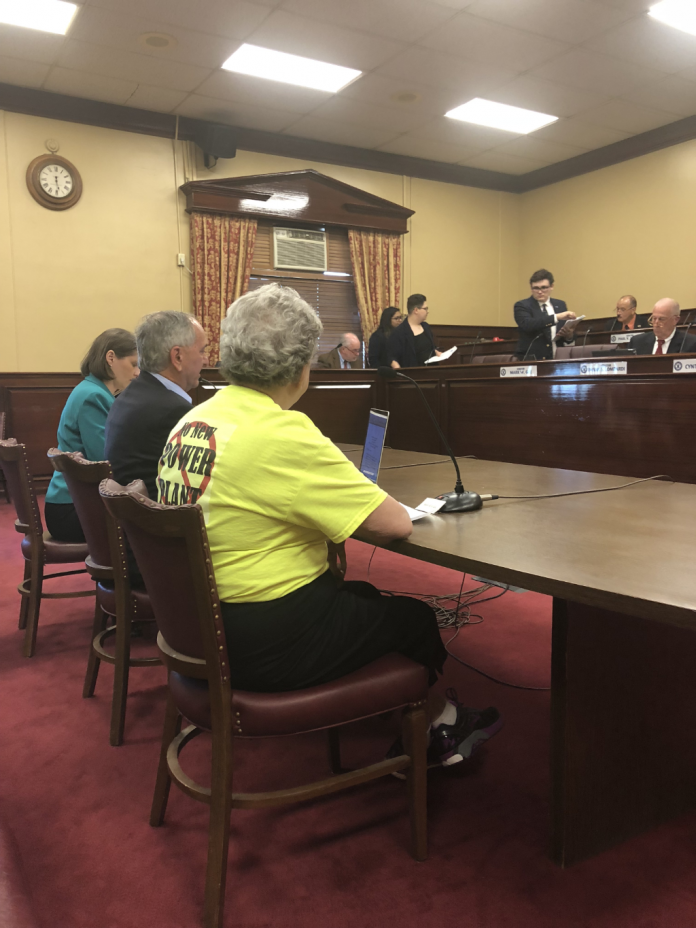
BURILLVILLE – The outcome of legislation that would change how Rhode Island’s Energy Facility Siting Board operates won’t affect whether or not Invenergy Thermal, LLC will be granted permission to build a power plant in the town of Burrillville.
But after three years of fighting a statewide process that they say gave them little opportunity for input and not enough access to clear information, some Burrillville residents are invested in making sure it doesn’t happen again.
“We were all jolted awake at this and forced to become experts,” said resident Donna Woods of the company’s proposal to erect a 1,000 megawatt fracked gas- and oil-burning power plant off Wallum Lake Road. “I think it is crucial here is that we don’t frame this as a group of angry advocates.”
“The future of Rhode Island will be decided by what we do here today,” she said.
Woods was one of several advocates from town to testify in favor of S-2905 at a hearing this week before the Senate Judiciary Committee. The bill would change the now 30-year-old process by which the state reviews proposed plants, increasing the number of ESFB members from three to seven, with at least two tied to the host community, among other reforms. A companion bill was already passed in the House of Representative.
On Thursday the legislation was held by the committee for further study.
“It gives protections and rights to those people and communities that will be affected,” said Mary Pendergast of Sisters of Mercy in Burrillville.
Critics of the current law note that the decision over where power plants can be sited in the state is made by too few people and that the application process should require that all documentation be deemed complete for a project to move forward. The proposed reforms, they say, were modeled after neighboring states including Massachusetts and New Hampshire.
Sen Paul Fogarty, who sponsored the bill, said that Invenergy can take credit for the proposed changes “because they boggled their application at every step.”
“This will have no affect on the Burrillville application, but it came about because of the Burrillville application,” Fogarty said.
Two individuals did testified against the bill.
Frank McMahon of National Grid said his company is opposed to the legislation because it could increase the overall cost for ratepayers.
“The vast majority of issues before the Energy Facility Siting Board are not related to power plants,” McMahon said, noting that the change will also alter the process for erecting transmission lines. “We’ve got one application and the whole world is upside down. We do have certain realities. You’re going to need transmission lines.”
Douglas Gablinske, executive director of TEC-RI, a non-profit that advocates for affordable energy prices, said the proposed change in EFSB membership to include members from host communities would remove objectivity.
“You would never have a power plant built in Rhode Island again,” Gablinske said.
Burrillville resident Mike Lamoureux disputed the assessment.
“This bill does not make Rhode Island more difficult to do business with, but makes sure we do business with the right people with the right level of quality,” he said.
Jason Olkowski of Keep Rhode Island Beautiful noted that Burrillville planning and zoning officials were asked to provide advisory opinions about Invenergy’s proposed Clean River Energy Center with inadequate information.
“They didn’t even have the information they would normally get to build garages and sheds,” Olkowski said. “You heard about a lack of trust with the current process because key pieces of information are not required.”
Burrillville Town Council member Raymond Trinque agreed.
“You couldn’t build a garage in the town of Burrillville with the amount of information given by the applicant,” he said.
Trinque also disagreed with that idea that there would never be another power plant built in the state, noting that as 32 communities in Rhode Island passed resolutions against the current proposal, many expressed confusion about the process.
“They don’t understand, and we don’t understand, why there’s no local control in this at all,” he said.
After the vote to table the legislation, Sen. Erin Lynch Prata, the committee chairperson, told Fogarty of the bill, “We hope to have this back relatively soon.”






